BY R.D.
What color, or multicolored dynamic, defines governance?
Ever since Mark Jefferson Golding became the leader of the People’s national Party (PNP) in November 2020, Jamaica’s motto, “out of many, one people,” has become a subject of political scrutiny.
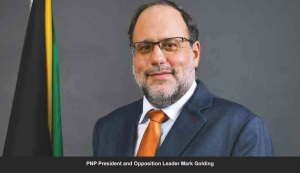
The country is no stranger to heated elections; since its independence from British rule in 1962. Experts have often compared the battles between political parties to atmosphere-like tribes vying for territory.
No matter whether the party is in power or who backed the previous election, many voters seem to swing like a pendulum, but not always smoothly.
Within the intricate framework of Jamaica’s class system, the dynamics of social status and political affiliations frequently assume a pivotal role in ascertaining an individual’s standing.
However, in the current version of this general election, the main focus is on the realm of eligibility, resulting in a multitude of disagreeing inquiries. Is this truly the underlying reason behind it?
In today’s political atmosphere, which has seen more conflict than cooperation in many aspects of our society, the hidden question is. Should Jamaicans elect someone who appears to be descended from the Royal family tree, especially after independence, given the role colonialism played in their forefathers’ lives?
Say it loudly, then change the constitution.
The democratic system in Jamaica has demonstrated remarkable resilience in the face of the post-independence in 1962.
For many years, there has been an unsaid question: which hue is best suited for modern Jamaican governance?
Some politicians seem to be leveraging the challenger’s British dual citizenship and ignoring his Jamaican birth certificate.
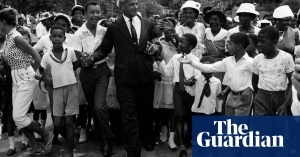
According to local media, opposition leader Golding recently stated that he does not have to choose between the two.
Critics argue that he must publicly commit to Jamaica alone to lead the people. Many hope this is not a “Birther” debate like elsewhere.
Sadly, the “us and them” mentality may stem from humans’ innate tendency to split the world into groups and favor their own, but this political strategy can be dangerous.
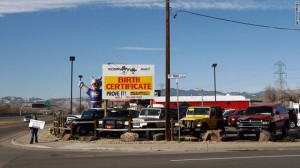
Could the nuanced suggestion of using one’s color as a way to gauge Jamaica’s representation, while also recognizing the possibility of adjusting eligibility, sway voters to change their voting preferences?
Nevertheless, the paramount concern in the forthcoming elections is not eligibility, but rather the image that should guide Jamaica.
Though I am not an expert on Jamaican politics, it may be time to examine the situation more closely because many government officials may also be dual citizens or have green cards, which entitle them to permanent residency in other nations.
Born in Boston, Massachusetts, United States, Edward Philip George Seaga, was a former prime minister of Jamaica, had Lebanese Jamaican parents.
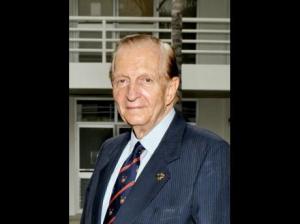
Edward Philip George Seaga: Former Prime Minister of Jamaica
Based on reports, Golding is running a strong campaign. The incumbent’s path to victory, again, may have more holes than many local roads.
Experts noted that he has a good chance of becoming Jamaica’s next prime minister.
Apparently, many noted that it seems race or ethnicity is now a factor and a distraction in the fight against crime, poverty, and corruption to develop the nation going forward.
Many who blamed rising inequality, poverty, corruption, and criminality for the then-political and economic turmoil are now asking what has changed since 2016.
On this governmental surfboard, there is a never-ending political balancing act.
Jamaicans faced challenges once again during the Holness administration in 2020 due to the economic impact of COVID-19, which has affected economies worldwide.
The local challenges it presented also exposed the deficiencies in the healthcare system and the service sector economy, shedding light not only on Jamaica but also on the vulnerabilities of the surrounding regions.

Sure, vacationers are arriving in large numbers, but who is actually hopping on a surfboard after a long 10-12 hour shift or stocking their pantries till the next paycheck?
Even with better roads and technology today, if you have not driven on one, have internet access, or have running water, there’s hope, but it depends on your economic status that may be the ultimate driver.
Years later, reports show that wealth discrepancies persist, as does a generational shift that contributed to JLP’s success.
The party now claims to have the requisite knowledge to keep its promises, but one wonders if this is too little, too late, or just another example of a never-ending cycle.
Those younger voters who were key to the JLP’s win are now grown up and continuing to fight for that economic balance on both sides.
The political shift
Following an extended period of governance by the PNP, there has been a visible political shift across several constituencies.
In 2016, experts pointed out that the electorate needed a new route from the PNP, longstanding politician Portia Simpson-Miller.
Despite some voters’ opinions, particularly on the opposing side, then-Prime Minister Simpson-Miller’s triumph over a male-dominated system was a significant accomplishment for Jamaica and women.

Former P.M. Simpson-Mill/er and PM Holness
Jamaica had another election in 2020 during the pandemic, which the opposition deemed unwise. Despite P.M. Holness’ internal discord, the JLP used Dr. Phillips, low-polls to their advantage as rivals perceived him as part of the previous system.
Andrew Holness was sworn in as prime minister for a second term on September 7, 2020.
What would a third term entail, given that the same questions have persisted for decades under both parties, particularly concerning the marginalized? What has changed?
Commentators predict that the 2025 general election will be a referendum once more, testing the administration’s authority, and even the Constitution as another fight approaches the ring.
What have you done for me recently, and how do fresh voters on both sides fit into the daily calculations long-term?
Campaigning for the 2025 general election will be different. Visits to local shops, cash distribution, playing dominoes, dancing to tunes, and temporary road repairs will not win either side.
Today’s voters are dynamic, media-savvy, more educated, and willing to work with dedicated party members to improve their lives, their parents’ lives, and the community.
Fortunately, they are also able to discern what party is saying, “Thank you, Jah, for what you have provided with the JLP,” while others are shouting Bob Marley’s line, “Even though the rain is falling, the ground is still tough, and a hungry person becomes an angry person.”
So, you want to play the game : prints, posts, tweets, or wild ride of statistics, and news headlines!
Critics argued while then-Prime Minister Simpson-Miller was learning the internet, charismatic rival Andrew Holness was like a vanguard of technology, especially among younger people, and masterfully controlled the narrative that was so critical in his 2016 triumph.

Today is different, and in a similar fashion to the JLP in 2016, the PNP team has taken to social media to challenge the JLP’s narrative on various issues by sharing their own data and figures.
Both sides will present poll results, favorability ratings, local income, economic growth, infrastructure spending, taxes, completed buildings, trade deficits, healthcare development, crime, jobs, poverty, unemployment rate, new roads, and national growth.
Choose one today because there will most likely be others before the 2025 election.
Today appears to be the best photo-ops contest. Unfortunately, if one party attends a local school or travels overseas within 48 hours, it seems the other does too.
A voter said, “Both parties brag about the drop-in crime rates, inflation, and list of achievements over the past ten years or more, but I can’t see it on my side of town.”
“We saw Haitian deportation and Chinese immigrants arriving.”
What is in it for me now, and what have you done for me lately?”
Today, voters expect results and accountability. Many are tired of upward mobility feeling like a lottery to advance and enhance one’s life.
Young college graduates must decide whether to immigrate to avoid intellectual loss or underemployed with economic uncertainty.

“People will forget what you said and did, but never how you made them feel.” Maya Angelou.
“Every day is a never-ending struggle to navigate the treacherous landscape of maintaining how to pay back a student loan,” a student said.
They worry about how to afford a house in the pricey real estate market after college. Since many of their parents are teachers who could use additional educational resources, they are aware of the school safety meeting that follows every conflict and the blame games that are played on both sides who had an opportunity to resolve these problems.
Even when professionals signal a drop in crime, the dispute over perception and reality continues. They are aware of the funerals performed for young victims murdered by criminals, and often unresolved.
Fear is several local businesses closing many shops early, limiting street sellers and making block party licenses tougher to get to reduce crime.
What have you done for me lately? The rising prices of vital food goods, such as a loaf of bread you bought a year ago for double the price and much smaller, is frustrating not only in Jamaica.
Regrettably, price gouging is a common issue faced by many in the local community. Even with existing laws, their enforcement is lacking, leading to hoarding and worsening shortages, particularly in times of emergencies. These elevated prices persist unchanged even as inflation decreases.
The recently issued US$150 million catastrophic insurance disaster bond may not matter to voters, though it is important.
What have you done for me lately? Mental health, substance abuse, and career opportunities for the overlooked must be addressed by the government, even though it cannot fix everything quickly.
The other neighborhood on this side of town?
In what seems to be a hostile political climate, some voters are blocking roads that have hurt local businesses to attract public authorities’ attention to neighborhood issues, as reported.
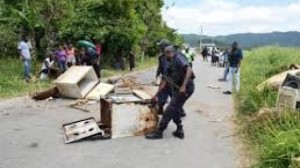
Unfortunately, disrupting and dividing your once-close communities with politics never works. You failed, not them!
Many expats, some of who are oral historians, expressed sadness about the ongoing behavior for decades.” Politicians often give money and alcohol to clean up trash, the tension dies down until another election draws near, but this is unsustainable.”
A monthly election seems vital for progress. Unfortunately, many people vote without considering their long-term well-being, waiting excitedly for the outcome as poverty rises!
After most elections, shops increase prices, schools and hospitals need repairs, including road upkeep, and community conflict persists. Economic survival seems to be limited to the wealthy and connected.
Despite the rain, to summarize Bob’s song. But those without the means to plant seeds—the impoverished in particular—are frequently ignored as though there had been a drought.
Hovering near the ballot box; foreigners [Expats] chimed in:
Recently, on May 10, 2024, many expats marched in New York to protest export fees, crime, the economy, and corruption.
According to a local outlet, many pundits say it has not shaken the government, and they were unpatriotic.
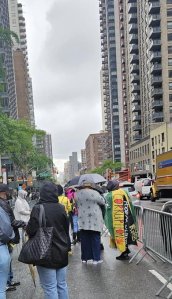
While it might have minimized the march from different viewpoints, the remittances and other disposable resources being sent to these shores have played a vital role in improving the lives of many local families and have contributed to the overall GDP.
Jamaican elections, like competitive sports, require extremely tight rules. Even when injured, many athletes must continue playing, especially if their competition is ahead or gaining an advantage.
Both sides appear more interested in fighting than addressing problems. As each side attempts to discredit each other.
Skepticism of politicians, government, and media persists. Many communities are skeptical about moving the nation forward through change and compromise.
While thoughts on the future of this lovely country and who will win the next election differ, the amount of people who turned out in the rain may have influenced non-voters, whether via heritage or an interest to watch the local news.

Except for people who share what data works from both sides, few voters will stop playing dominoes to analyze socioeconomic facts.
As noted earlier, the key, as the generation evolves, is to avoid being caught up in political polarization from either side. Form an “apolitical” group that holds leaders accountable on various issues including education, climate, equity, justice, inclusion, policymaking, work, and the economy.
Finally, each decision is about the future, not what’s in it for you today.
There are significant discussions going on, but in the end, one’s view of their own economic potential may have a greater impact than data or the legitimacy of their passport for government.
Best wishes!
